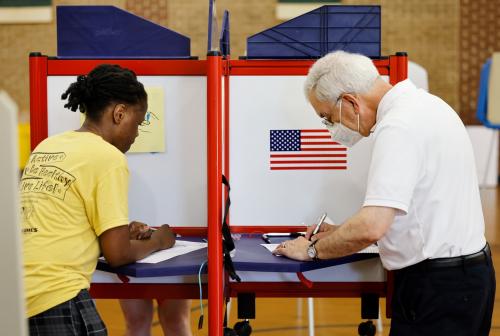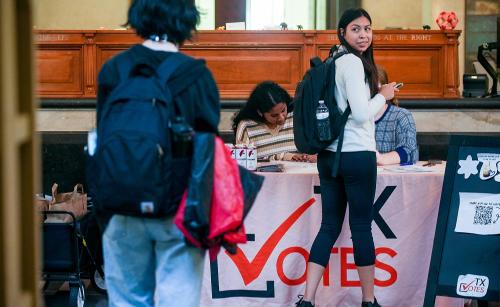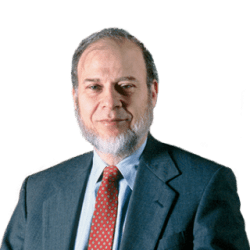A few weeks ago, I wrote about the Supreme Court’s upcoming argument in Trump v. United States in these pages.
In that piece, I anticipated that issues addressed in the civil context in Nixon v. Fitzgerald would receive considerable judicial attention. In Nixon, the question was whether the threat of civil litigation after a president’s term has expired might intimidate a president to the point where the threat affected a president’s exercise of his Article II Executive powers to the detriment of the constitutional scheme for the separation of powers.
In Trump v. United States, which the Supreme Court heard on April 25, the concern was not vulnerability to a civil lawsuit. It was instead vulnerability to post-term prosecution for crimes allegedly committed while in office. In Fitzgerald, the Court held, in a 5-4 decision, that former presidents were immune from civil lawsuits, buying the intimidation argument. However, in deciding for former President Nixon, the Court clearly stated that its decision did not mean that former presidents are immune from criminal prosecutions.
There are several reasons why presidents might enjoy immunity only in civil cases.
One is that the Constitution contains no civil litigation equivalent of the impeachment clause, which specifically makes a former president vulnerable to criminal prosecution following impeachment and conviction. Also, in articulating their intent to differentiate the president from a king, the Constitution’s drafters seem to have focused more on the criminal law than on the civil law in making the case for a president who, unlike a king, was not above the law. Finally, cost-benefit trade-offs differ in the criminal and civil justice settings. Allowing litigation that can deter legal violations may be more important when violations would be criminal.
Would executive function be hampered by the threat of post-term criminal liability?
As in the government’s Supreme Court brief, the government’s attorney was not at his best in oral arguments when the core issues in the case—those relating to Fitzgerald-justified immunity—were discussed. As in the brief, when pressed about whether the executive function would be hampered by the threat of post-term criminal liability, the government’s response was to emphasize the layers of protection that, according to them, would almost always prevent a former president from being convicted of a crime. Responding to this argument, Justice Alito rehearsed the many hurdles that an innocent former president might need to leap before a case was resolved, beginning with a motion to dismiss after charges were filed and perhaps not terminating until an appellate court reversed a jury’s guilty verdict. Alluding to the costs that navigating these steps would impose, Alito concluded with what seems like a tongue in cheek understatement, “So the protection is greatly diluted.”
The government counsel’s mistake was not in making his procedural protection arguments but in relying so heavily on them, and so little on anything else, when he offered reasons why the intimidating effect concerns that motivated the Fitzgerald majority did not carry over to criminal prosecutions. Additional and better arguments could have been made.
Presidents are not easily intimidated.
One is that presidents are made of stern stuff and not easily intimidated. To support this point, government counsel could have turned an argument made by Trump on its head. In his brief, Trump’s counsel listed past presidents’ arguably criminal actions to suggest that there has long been a constitutional understanding that former presidents are immune from criminal prosecution. There is virtually nothing that supports this interpretation. No Justice Department official has ever indicated that the prosecution of a former president didn’t happen because an attorney general thought a former president could not be tried for crimes committed while in office. Moreover, two past presidents, Nixon and Clinton, acted as if they did not think they had an immunity defense, nor did President Grant who paid a fine for speeding in his carriage down a street in Washington, D.C.
Cases Trump cites as part of a different immunity argument, (e.g. Roosevelt’s Japanese internment order and Obama’s ordering of an assassination by drone) undercut his Fitzgerald-based argument. They fairly suggest that far from being intimidated by the threat of later prosecution, presidents, when they thought it in the national interest, have been willing to issue orders that might violate criminal laws.
No president would want to prosecute a predecessor for fear of setting a precedent.
A second better argument is that, except in the most serious cases, no president would want to prosecute a predecessor for fear of setting a precedent that would allow, or even encourage, their successor to prosecute them. The government’s counsel did not make this argument when he listed the protections from criminal liability that an ex-president enjoys, but he quickly acquiesced when Justice Jackson made the argument for him, “I wonder, she said, whether some of the caution [about prosecuting former presidents] comes from an understanding that they will soon be former presidents as well.”
We rarely want our presidents to break the law.
A third, and perhaps the strongest argument, is that we rarely want our presidents to break the law. If fear of prosecution motivates compliance, that is an argument against rather than for presidential immunity. Indeed, in each of the presidential law-breaking cases the Trump brief cites, it would at least arguably, and in many instances almost certainly, have been better for the nation had the president been deterred from breaking the law. Again, the point was made, but only because Justice Jackson made it. Responding to an argument by Trump’s counsel, she said, “[Y]ou seem to be worried about the president being chilled. I think that we would have a really significant opposite problem if the president wasn’t chilled.” When government counsel did not pick up on this point when it was his turn to argue to the Court, she raised the issue, using different words, in the last question of the oral argument. Counsel missed the cue she attempted to give him, and the point was lost as the case ended.
Does the immunity issue really have to be solved once and for all?
Government counsel also let pass without comment the attempt of two of the Court’s more conservative members to deal with the Trump case as if they were dealing with an abstract issue that had to be resolved once and for all. Justice Gorsuch said, “…I’m not concerned about this case so much as future ones.” To emphasize the point, he also said, “we’re writing a rule for…the ages.” Justice Kavanaugh shared Gorsuch’s perspective, “…like Justice Gorsuch, I’m not focused on the here and now of this case. I’m very concerned about the future.”
While it might not have been wise to immediately dispute justices’ sentiments that did not invite a reply, government counsel could have later returned to the matter and made an argument that in theory might have appealed to a conservative Court. This is that the Court sits to decide cases and not to create rules that extend beyond what a decision requires. By reminding the justices that they were charged with deciding a specific case, counsel could have highlighted what Trump allegedly did and framed the issue as being whether former presidents were immune from prosecution when it was credibly claimed that to ensure their own reelection, they attempted to criminally subvert the democratic process. While a case deciding this issue would have had precedential value, it would not necessarily control future judgments in which facts differed. A rule could develop gradually, not for all time but by the case-by-case accretion that characterizes the common law.
Instead, both the government’s attorney and the justices appeared to accept Trump’s counsel’s framing, which asked whether presidents could be criminally prosecuted for official actions. Moreover, because all participants, including Trump’s attorney, seemed to agree that former presidents could be prosecuted for unofficial actions, much of the argument focused on the difference between unofficial and official actions, implicitly assuming that the distinction mattered.
Must a president first be impeached?
But the distinction only matters if Trump’s counsel is right in arguing that the impeachment clause means that an ex-president’s immunity can be abrogated only if the president is first impeached and convicted. The government appears to have the stronger argument by far on this issue, but the discussion made it seem that Trump’s counsel’s interpretation of the impeachment clause was correct, and that the most important questions to dispose of were whether the different activities giving rise to the charged crimes were official or unofficial actions. A Court might give Trump the delay he seeks by remanding the case to determine if any of the behaviors charged in the indictment were official actions. A convenient rationale would be that this was done because the constitutional issues need not be addressed if the crimes charged were either found to involve only unofficial actions or were dropped at the instance of the prosecution.
The real issue is delay
Trump’s main concern seems not to gain immunity but to delay any trial until after the November election. Trump’s strategy was given away early in his counsel’s oral argument when counsel retreated from Trump’s claim to absolute immunity for actions taken while president. Instead, Trump’s counsel willingly acknowledged that without being impeached, Trump could be tried for crimes involving unofficial actions, like employing a private attorney to spread false claims of election fraud. Trump’s counsel did not, however, admit that some actions that seem to have been done to further Trump’s private interest in securing reelection, like calling on the Chair of the RNC to help assemble slates of false electors, were in fact private. Instead, he argued that this and a few other allegedly criminal actions had a nexus to Trump’s official duties sufficient to place them on the official side of the private/official divide. Counsel’s characterization of Trump’s allegedly illegal actions as official actions are in many instances disputable to the point of being hard to credit.
These claims are likely to be rejected by a court, but rejecting them would most likely require a hearing in the trial court. If the Court, following Trump’s counsel’s suggestion, remands the case to the trial court to differentiate between Trump’s public and private actions, whatever the trial court decides, the time needed to do so and the time that can be exhausted by even frivolous interim appeals mean a trial before the election will not occur. If Trump is elected president, he will enjoy four years of immunity from criminal prosecution, even if the Supreme Court later decides that former presidents have none.
The government’s attorney has argued that remand is unnecessary because Trump is not immune from prosecution unless the crimes he is charged with relate to functions, like the pardon or veto power, that the Constitution has specifically placed within the sphere of exclusive executive discretion. The government’s fallback position is that if the Court chooses to remand for further fact finding, it should do so with instructions that allow the trial court to resolve open issues within the context of an ongoing trial. This seems unlikely. If the Court remands this case, it will almost certainly do so with the unspoken intent of granting Trump the delay he seeks. We should get a hint of whether this is the majority’s intent by when the decision is released. If it is at the end of the Court’s term, which is when the notable opinions are usually released, the Court will already be cooperating to secure for Trump the maximum delay possible.
The government might also drop charges in the indictment, like communications from Trump to the Attorney General, that might plausibly be considered official acts in the hope that the trial can then proceed. The problem here is that Trump is arguing that some acts which seem clearly private are in fact official. These claims will have to be resolved.
Can presidents be charged criminally if they haven’t first been impeached?
The oral argument gave surprisingly little attention to the question of whether the Constitution’s impeachment clause means that presidents cannot be charged criminally after leaving office unless they have first been impeached and convicted. This is surprising since the issue received considerable attention in the parties’ briefs, and if answered in the negative, the official/private distinction no longer matters. The Court gave more attention than I think the matter deserves to Trump’s “clear statement” argument; namely, that unless a criminal statute states specifically that it applies to the president, it does not apply. Accepting this argument means that only in very limited circumstances would a former president face criminal liability, even if he has been impeached and convicted. This is because very few criminal statutes say specifically that the president is among those covered by the law. But neither do they say the president is excluded from a statute’s bans, and Congress’s default assumption has almost certainly been those criminal laws—which by their language apply to everyone—apply to presidents. Still, Justice Kavanaugh, in particular, queried counsel as if he thought there was something to the argument. It is conceivable that a justice who disagreed with a plurality’s rationale for siding with Trump would give him the victory he seeks by deciding for him on these grounds.
So, what will happen?
It is not possible to know from the oral argument how the judges will decide a case, but good guesses are possible, and in many of the cases decided by the current version of the Roberts Court, forecasts have proved accurate. Judging from what I heard in the oral argument, the three liberal justices, Jackson, Kagen, and Sotomayor, appear all but certain to decide that Trump lacks immunity and would remand for trial rather than for further fact finding. Not only do their liberal views lead one to expect this, but the questions these judges asked often seemed designed to elicit government counsel’s best arguments, or to respond more effectively than government counsel, to questions posed by the Court’s conservative members.
Looking at those justices who are regarded as conservatives, Justice Thomas seems certain to be in Trump’s camp. I say this not because Thomas gave much away by the few questions he posed, but because of his voting history, and because his refusal to recuse himself despite his wife’s role in attempting to delegitimate and reverse the election’s outcome on Trump’s behalf speaks volumes. Justices Alito and Gorsuch also seem highly likely to find some way to give Trump what he seeks, whether it is delay or a judgment granting immunity. Their questioning most favored Trump’s positions. Judging by their questions, Justices Kavanaugh and Roberts also seem likely to find a way to hold for Trump, with Kavanaugh apparently more supportive of Trump than Roberts. I expect these two will vote to remand the case for further fact finding. The sixth member of the Court’s conservative wing, Justice Barrett, asked intelligent questions that seemed to seek counsels’ views on the case, without favoring one side or the other. I would not be surprised if she sided with the liberal Justices, but perhaps not for the reasons they give, or, if she sides with Trump, that it will be for reasons not shared by others on the Court. I am, however, the first to admit that these views are guesses. It is also possible that, with an eye to the decisions and the Court’s legitimacy, positions will be tempered so as to maximize the number of justices who sign onto or concur with a majority opinion and to minimize the number or extremity of dissents.
The Brookings Institution is committed to quality, independence, and impact.
We are supported by a diverse array of funders. In line with our values and policies, each Brookings publication represents the sole views of its author(s).








Commentary
Trump v. United States: Comments on the oral arguments
May 15, 2024